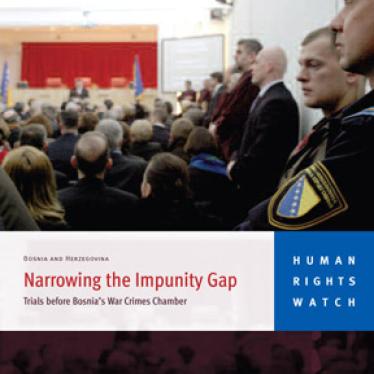Bosnia’s War Crimes Chamber has made considerable progress in bringing perpetrators to justice, but to increase public confidence it must do more to explain its work to the people of Bosnia, Human Rights Watch said in a report issued today.
The war in Bosnia, which lasted from 1992-1995, was characterized by mass killings, rapes, widespread destruction and forcible displacement of the population. The International Criminal Tribunal for the former Yugoslavia (ICTY), which is scheduled to close in 2010, will only have tried a limited number of top-level perpetrators by the end of its mandate. Effective national prosecutions are needed to hold to account the numerous remaining perpetrators.
“Bosnia’s War Crimes Chamber gives victims of brutal crimes committed during the war an important opportunity to see justice done,” said Param-Preet Singh, counsel with Human Rights Watch’s International Justice Program. “The chamber’s work has made an impact by narrowing the impunity gap in Bosnia through fair and effective trials.”
The 61-page report, “Narrowing the Impunity Gap: Trials Before Bosnia’s War Crimes Chamber,” evaluates the chamber’s work in conducting trials. Although a relatively new institution, the chamber has made substantial headway in trying cases, including the trial of 11 defendants charged with genocide for their role in the Srebrenica massacre. Other important accomplishments include introducing support for witnesses in the pre-indictment phase and establishing an effective defense office committed to assisting defendants in trials before the chamber.
“Donor countries have played an important role in helping the chamber succeed,” said Singh. “Ongoing support for the chamber’s work is essential to building respect for the rule of law in Bosnia.”
Despite its progress, Human Rights Watch expressed concern about features of the chamber’s operations that could undercut its effectiveness. For example, there is confusion about the prosecution’s policy for the selection of cases. Human Rights Watch also noted with concern the court’s use of closed sessions, and inadequate outreach and communications efforts to explain the court’s work to the communities most affected.
“The lack of information about the chamber’s work risks undermining the public’s confidence in the institution,” said Singh. “The chamber must do more to make its work understood by the people of Bosnia.”
The report identifies achievements of the chamber and makes recommendations on how to improve its operations and share its expertise with district and cantonal courts in Bosnia, which will hear the majority of domestic war crimes cases. The report builds upon Human Rights Watch’s February 2006 report, “Looking for Justice: The War Crimes Chamber in Bosnia and Herzegovina,” which assessed the chamber’s operations during its establishment phase.
The War Crimes Chamber was established in early 2005 to facilitate fair and effective war crimes trials within Bosnia. In addition to handling cases initiated locally, the chamber also tries cases of mid- and lower-ranking defendants referred to it by the ICTY. To date, the ICTY has referred five of its cases, involving nine accused, to the chamber.
The chamber is the latest in a series of “hybrid” tribunals that are supported by the international community and aimed at bringing to justice those responsible for the worst crimes committed during war. Other examples include the Regulation 64 panels in Kosovo and the Special Panels for Serious Crimes in East Timor.
Although the chamber presently includes international staff to provide assistance in handling war crimes cases, the international staff will be phased out within a relatively short timeframe. Human Rights Watch recommended, among other things, adopting a flexible approach in retaining international staff as needed within the general framework of the completion strategy, so that the chamber can operate effectively while it transitions to a fully national institution.







